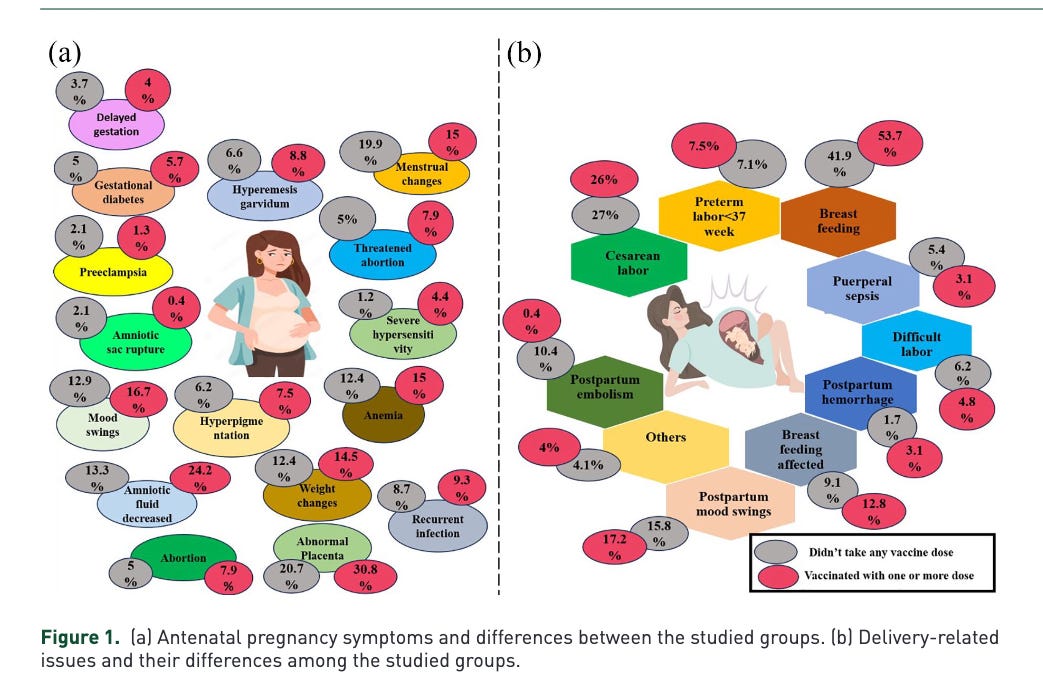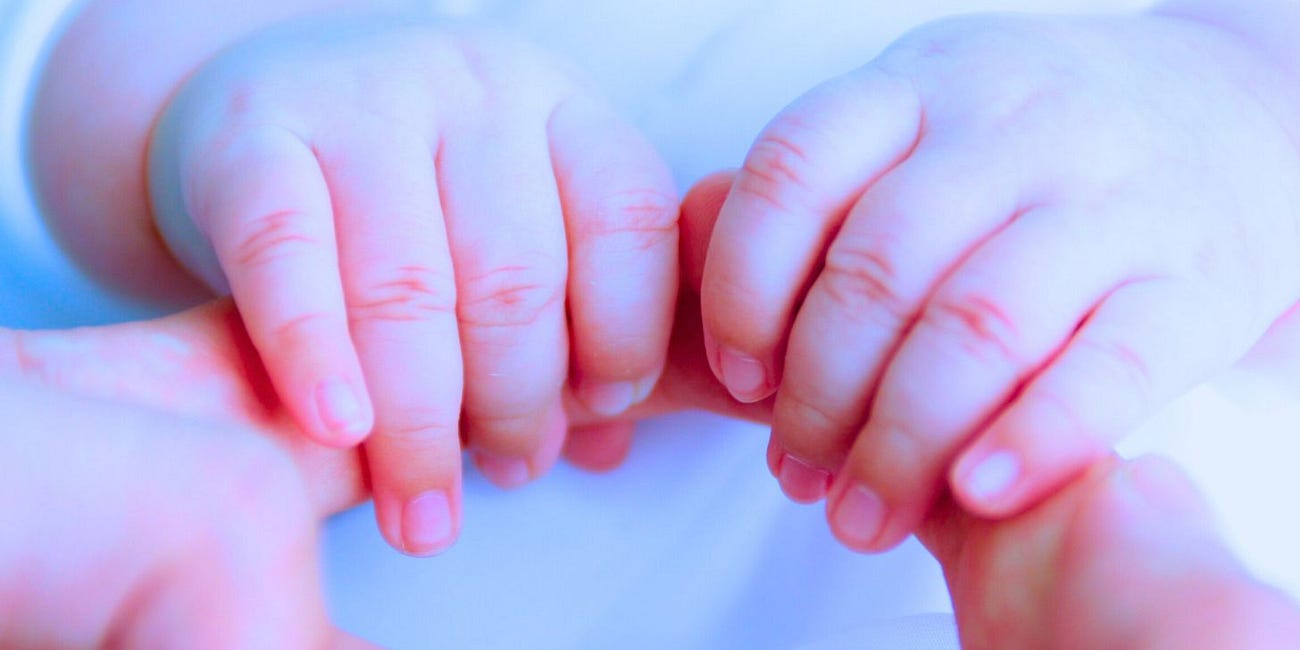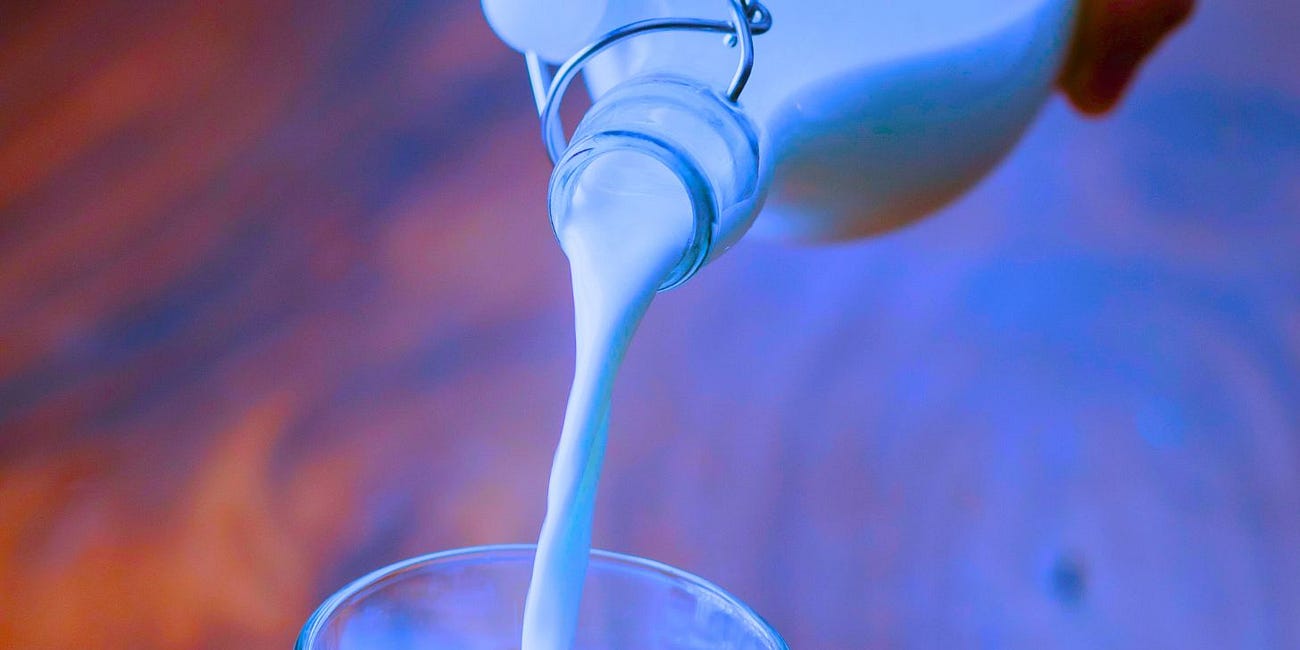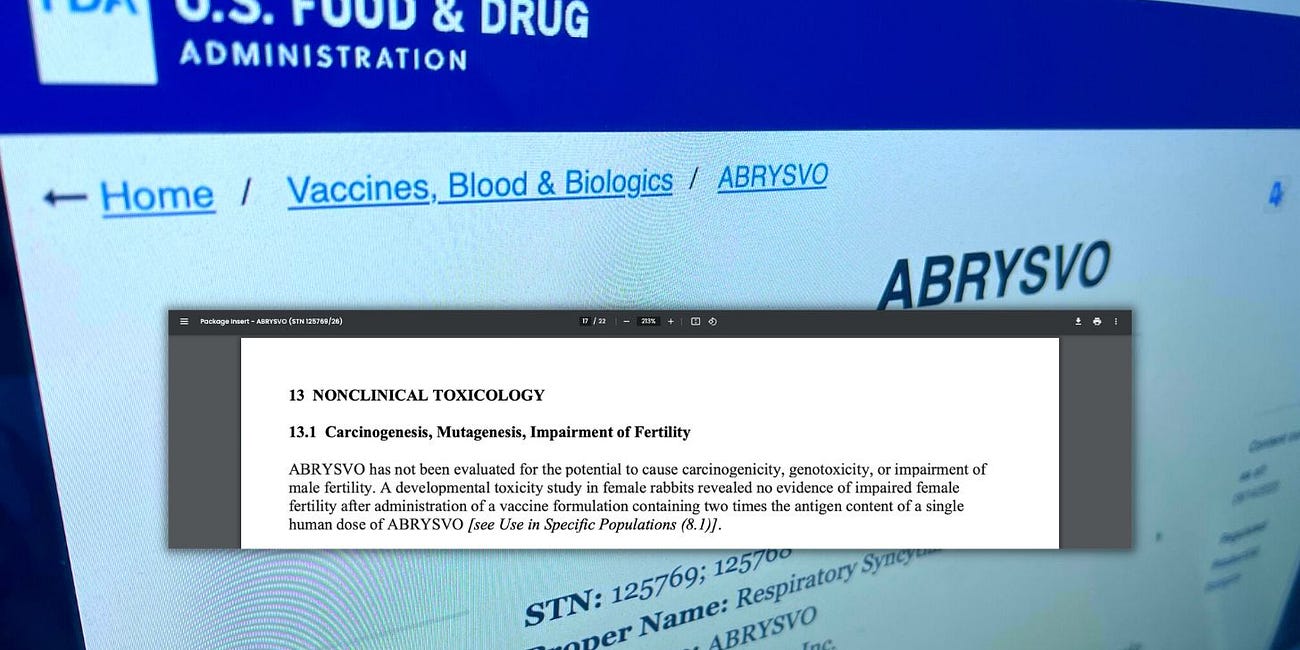COVID-Jabbed Pregnant Women Have 'Significantly Higher Rate' of Miscarriage, Abnormal Amniotic Fluid and Placenta: Journal 'Therapeutic Advances in Vaccines and Immunotherapy'
"[M]ore cases of malaise, headaches, chest pain, breathing problems, and sleep problems," study confirms.
A new study published this month in the peer-reviewed journal Therapeutic Advances in Vaccines and Immunotherapy confirms higher rates of adverse pregnancy outcomes, including spontaneous abortions, oligohydramnios (abnormally low amount of amniotic fluid surrounding the fetus), and abnormal fetal growth, among pregnant women who received at least one dose of the COVID-19 jab compared to those who didn’t take the gene therapy drug.
Follow Jon Fleetwood: Instagram @realjonfleetwood / Twitter @JonMFleetwood / Facebook @realjonfleetwood
The study looked at the prevalence and issues of COVID-19 injection adverse events among pregnant women.
The authors call for “clear and trustworthy information” regarding COVID jabs, “particularly among pregnant women who face higher risks of severe illness.”
“Given the increased risk of severe viral pneumonia in pregnant women, it is critical to foster confidence in the vaccine’s safety and understand any potential adverse events (AEs),” they write.
Conducted March to May 2022 in Jeddah, Saudi Arabia (SA), the researchers compared women who did not get any doses of the COVID gene therapy drug during pregnancy (Group A) to women who did get at least one dose during pregnancy (Group B).
They analyzed the frequency, types, AEs, and management of AEs of the COVID shot, and explored pregnancy, delivery, and fetus-related complications like miscarriage, birth defects, and preterm labor.
The Pfizer vaccine was most commonly taken among the patients, followed by AstraZeneca and then Moderna.
The cross-sectional study involved 438 women who gave birth or were pregnant within the previous 8 weeks.
Most participants were aged 25 to less than 35 (58.8%), and 287 (61.3%) were university graduates.
Data was collected through face-to-face interviews with skilled nurses in 13 randomly selected primary healthcare facilities, using a validated, well-structured questionnaire that included the Centers for Disease Control (CDC) COVID injection-related AEs, according to the study.
You can download the full study below:
More Adverse Events Among COVID-19-Jabbed Pregnant Women
The authors confirm those who received a shot (Group B) had “significantly higher” rates of these AEs.
“[W]omen in Group B had a significantly higher rate of abortions, oligohydramnios (24.4%), abnormal placentas (size and location), 103 (42.7%) abnormal fetal growth, 122 (53.7%) problems breastfeeding, blood pressure problems, and more cases of malaise, headaches, chest pain, breathing problems, and sleep problems than women in Group A,” they write.
The researchers emphasized how COVID-jabbed pregnant women experienced significantly higher rates of spontaneous abortions and severe hypersensitivity compared to unvaccinated women.
Per the study: “Among the studied groups, we found that Group B (which received at least one COVID-19 vaccine dose during pregnancy) was significantly (p < 0.05) associated with higher frequencies of spontaneous abortion (miscarriage) than Group A. Severe hypersensitivity compared to pregnant women in Group A who did not receive any COVID-19 vaccination dose during pregnancy, the rate of severe hypersensitivity was 10.4% (4.4%; Table 2 and Figure 1(a)).”
Nearly 8% of COVID-jabbed women suffered a spontaneous abortion compared to 5% of the non-jabbed group, a graphic included in the study reveals.

Moreover, there were “statistically significant differences among the studied groups regarding abnormal fetal growth and the frequency of impaired breastfeeding to be significantly (p < 0.05) higher in Groups B 103 (42.7%) and 122 (53.7%) compared to Groups A 74 (32.6%) and 101 (41.9%), respectively.”
The most common self-reported general AEs among the two groups following COVID shot administration were “malaise, body ache, body ache, headache, running nose, smell or hearing impairments, skin disorders, and hair whitening and falling.”
The jabbed “had significantly higher frequencies of malaise, bony ache, headache, chest pain, breathing difficulties, and sleep disturbances.”
The most common lab-related adverse events in vaccinated women were anemia (64/349), thrombocytopenia (25/349), and liver function disturbances (22/349).
Most participants required painkillers and fever reducers after their first COVID drug dose, some cases even needing medical attention and one requiring hospital admission.
“Regarding the management of COVID-19 vaccina-tion-related AEs, after the first dose of different types and doses of vaccines, most of the participants (131/62.7%) needed painkillers and fever reducers from Pfizer, 34/58.6% from AstraZeneca, and 4/40 from Moderna. Only one case (10 after Moderna) required hospital admission, while 11 cases (4/251 after Pfizer, 2/70 after AstraZeneca, and 1/10 after Moderna) required medical attention,” the study reads.
After the second dose, “most participants required analgesics and antipyretics; medical consultation was required in 11 cases (5/209 after Pfizer, 4/58 after AstraZeneca, and 1/23 after Moderna); and hospital admission was required in only one case (58 after AstraZeneca). After the boss dose, most participants required analgesics and antipyretics; medical consultation was required in 5 cases (1/23 after Moderna and 4/105 after Pfizer).”
Moreover, the percentage of abnormal birthweights in the injected group was higher (49.3%) than the non-vaccinated group (39.0%).
Follow Jon Fleetwood: Instagram @realjonfleetwood / Twitter @JonMFleetwood / Facebook @realjonfleetwood
'Higher Pregnancy Rate for the Unvaccinated' Compared to COVID-19 Jabbed in IVF Study: Journal 'Clinical and Experimental Medicine'
A new study published Tuesday in Clinical and Experimental Medicine analyzed the effect of Pfizer Inc.’s mRNA COVID-19 jab on in vitro fertilization (IVF) treatment outcomes.
37 Pregnancy Complications Linked to COVID-19 Jab: Study Preprint
In a recently published preprint study on Preprints.org, a team of independent researchers has raised significant concerns about the safety of COVID-19 shots for pregnant women.
Colostrum 3 Times More Effective Than Flu Vaccination: Journal 'Clinical and Applied Thrombosis/Hemostasis'
A resurfaced study from 2007 reveals that colostrum, a substance produced by mammals shortly after giving birth, is significantly more effective than traditional flu vaccination in preventing influenza.
'Autism-Like Behaviors' in Offspring of COVID-Vaccinated Pregnant Rats: Journal 'Neurochemical Research'
A new study published online Wednesday ahead of print in Neurochemical Research confirms COVID-19 mRNA vaccines “significantly” alter gene expression and brain cells and produce “autism-like behaviors” and reduced social interaction in rats.
COVID-Vaccinated Mothers More Likely to Have 'Functional Lactation Disorders': 'Journal of Korean Medical Science'
A study published Monday in the Journal of Korean Medical Science evaluated the association between COVID-19 vaccination during pregnancy and lactation and reporting risk of adverse pregnancy or lactation outcomes.
Pfizer's RSV Vaccine for Pregnant Women Has 'Not Been Evaluated' for Cancer, Genetic Damage: FDA Package Insert
The U.S. Food & Drug Administration (FDA) package insert for Pfizer Inc.’s RSV (respiratory syncytial virus) vaccine has not been tested for causing cancer or genetic damage.
COVID Vaccinated Could Shed Lipid Nanoparticles, Spike Protein Through Blood Transfusion, Breastmilk, Organ Transplantation, Exhalation, Skin-to-Skin Contact: New Preprint Study
A new study made available online today in preprint analyzes exposure to COVID-19 vaccine components such as lipid nanoparticles or spike protein.
'You Are Placed on Formal Notice': Doctor Demands Obstetricians, Gynecologists Halt COVID-19 Vaccine Use in Pregnancy
In a bold move to protect patient health, Dr. James Thorp, a prominent Obstetrician and Maternal Fetal Medicine specialist, has issued a stark warning to leading medical organizations regarding the administration of COVID-19 vaccines to pregnant women.
Veteran OBGYN Calls on Lawyers to Represent Babies 'Damaged' by COVID-19 Jabs
Veteran Obstetrician and Maternal Fetal Medicine specialist Dr. James Thorp has issued a grave warning about the risks associated with COVID-19 vaccines in pregnant women and is calling for plaintiff’s attorneys to prepare for a surge in litigation related to vaccine injuries.
Trump Vows to Investigate Big Pharma for Rise in Autism, Infertility, Obesity, Allergies, Child Illness (Video)
In a recent address, former President Donald Trump expressed grave concerns over the increasing prevalence of chronic illnesses among children.
















A travesty of the highest order
Killing babies to save them